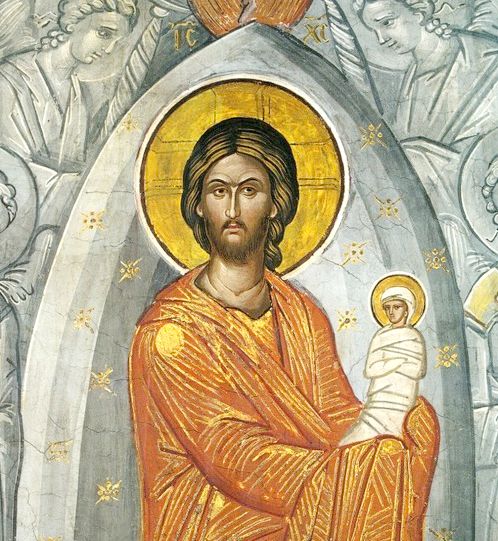
by Fr. Patrick Henry Reardon
The Church Fathers sometimes use the word synthesis when they speak of the mutual relationship of man’s soul and body (E.g., Clement of Alexandria, Stromateis 4.26; Cyril of Alexandria, Letters 45; Maximus the Confessor, Letters 15). When they treat of the synthetic quality of human nature, however, they are not content to describe it in the static terms favored in classical philosophy. In the Fathers, the union of the soul and body in man is portrayed, rather, as a dynamic conjunction directed towards a further fullness that transforms them both. Thus, in patristic literature, classical Greek psychology is reshaped by the biblical perspective of linear history and eschatology.
Without the authority of the Bible, it did not occur to classical philosophy to study psychology through the lens of history. Plato, for instance, thought of the soul’s union with the body as “unnatural” to the soul’s proper experience and destiny; the thrust of the soul was upward, while the body savored things of earth. Aristotle, with a more generous assessment of the union of soul and body, treated them, respectively, as the form (morphe) and the matter (hyle) of the human composition.
For the Church Fathers, however, the very relationship of soul and body in man provides his native preparation for a higher calling; this historical vocation of the human being is the basis for the union of soul and body. It is not static; it is directed towards human destiny itself, the fulfillment of human history through union with God.
We may take the thought of Gregory the Theologian as an illustrating example. Adam and Eve, according to Gregory, when God placed them in the original Garden, did not simply enjoy an ongoing natural beatitude. In their very nature they were summoned to an existence infinitely superior. Body and soul, conjoined in each human being, were the instruments and signs of a far greater conjunction, the union of man with God.
The soul, Gregory writes,
“is from God and is of God (ten ek Theou kai theian).”
Even as the soul is joined to the body, which is “something inferior” (cheironi synedethe), it “shares in a higher nobility” (tes anothen eugenias metechousin). The soul’s likeness to God, moreover, is not stationary. It confers an existence directed towards that further reality (pros ekeinen epeigenomenen). The synthetic being of man is dynamic; it points and pushes him toward a goal that will perfect its innate unity.
This happens in two ways, Gregory suggests:
First, man’s body and soul, inasmuch as they are different, tend toward different things. For this reason, their unity is not without struggle and strife, and the soul is thereby tested like gold in the furnace. Thus, the soul obtains the objects of its hope (elpizomena), not only by God’s gift, but through the exertion of virtue (aretes athlon). The native goodness conferred on the human being in his creation must be brought to perfection by his deliberate choice (proairesis).
Second, the soul not only resists the impulses of the body; it also draws the body toward God, so that “what God is to the soul, the soul would be to the body” (hosper esti Theos psyche, touto posyche somati). Thus, the soul
“accustoms its fellow-servant [the body!] to God” (oikosousa Theoi ton homodoulon).
In this text (Orationes 2.17), Gregory seems to assess the body’s role, with respect to the soul, as that of a resistant and rebellious underling, whose only contribution to the process was its antithetical impulse.
This was not, however, Gregory’s final word on the subject. He speaks elsewhere (14.7) of this bodily “co-worker” (synergos) in a more positive way. Even as it pulls the soul down, the body performs the valuable function of discouraging the soul from becoming pretentious. Without this struggle provided by impulses of the body, the soul—knowing its resemblance to God—might become puffed up with an unwarranted pride.
After all, the soul’s distance below God is vastly greater than its distance above the body. Indeed, the arrogance of the soul is more dangerous than the appetites of the body. Man is more at peril from what is higher in his nature than from what is lower.
In humbling the soul, then, the body acts as a
“well-disposed enemy and a plotting friend” (echthros estin eumenes kai philos epiboulos).
The believer makes the most of what is both
“a joint yoking and an estrangement” (tes syzygias kai tes allotrioseos).
Their complex relationship directs both soul and body to God.
“What,” asks Gregory, “is this wisdom in my make-up (he peri eme sophia)? And what a great mystery (mysterion) is this?”
